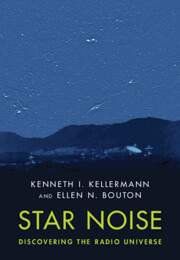Book contents
- Star Noise
- Star Noise
- Copyright page
- Epigraph
- Contents
- Foreword
- Preface
- Introduction
- 1 A New Window on the Universe
- 2 Radio Emission from the Sun and Stars
- 3 Radio Galaxies
- 4 Quasars and AGN
- 5 Radio Astronomy, Cosmology, and Cosmic Evolution
- 6 The Cosmic Microwave Background
- 7 Interplanetary Scintillations, Pulsars, Neutron Stars, and Fast Radio Bursts
- 8 Interstellar Atoms, Molecules, and Cosmic Masers
- 9 Radio Studies of the Moon and Planets
- 10 Testing Gravity
- 11 If You Build It, They Will Come
- 12 Expecting the Unexpected
- Notes
- Glossary: Abbreviations and Acronyms
- Journal Abbreviations Used
- Bibliography
- Suggested Reading
- Index
7 - Interplanetary Scintillations, Pulsars, Neutron Stars, and Fast Radio Bursts
Published online by Cambridge University Press: 04 May 2023
- Star Noise
- Star Noise
- Copyright page
- Epigraph
- Contents
- Foreword
- Preface
- Introduction
- 1 A New Window on the Universe
- 2 Radio Emission from the Sun and Stars
- 3 Radio Galaxies
- 4 Quasars and AGN
- 5 Radio Astronomy, Cosmology, and Cosmic Evolution
- 6 The Cosmic Microwave Background
- 7 Interplanetary Scintillations, Pulsars, Neutron Stars, and Fast Radio Bursts
- 8 Interstellar Atoms, Molecules, and Cosmic Masers
- 9 Radio Studies of the Moon and Planets
- 10 Testing Gravity
- 11 If You Build It, They Will Come
- 12 Expecting the Unexpected
- Notes
- Glossary: Abbreviations and Acronyms
- Journal Abbreviations Used
- Bibliography
- Suggested Reading
- Index
Summary
While trying to discover additional quasars, Cambridge University graduate student, Jocelyn Bell noticed a peculiar looking signal that turned up around the same time each night. With determined curiosity and drive, Bell realized that the peculiar signal was pulsing with a 1.3 second repetition rate. The remarkable discovery of pulsars confirmed the theoretical prediction of the existence of neutron stars, but the prediction played no role in Bell’s serendipitous detection of the first pulsars. Meanwhile, at a remote Alaska radar DEW Line station, US Air Force officer Charles Schisler observed pulses even when his radar system was not transmitting. Following an off-duty investigation at the Fairbanks library, he realized that these pulses had a cosmic origin and were not coming from approaching Soviet missiles, but his independent discovery of pulsars remained classified for decades. Later, while searching for new pulsars in old data from the Parkes radio telescope, West Virginia University radio astronomer Duncan Lorimer discovered a new phenomenon, known as fast radio bursts, which were confused with a similar bursting type radiation from a microwave oven.
- Type
- Chapter
- Information
- Star Noise: Discovering the Radio Universe , pp. 161 - 180Publisher: Cambridge University PressPrint publication year: 2023



